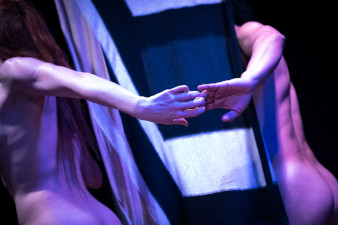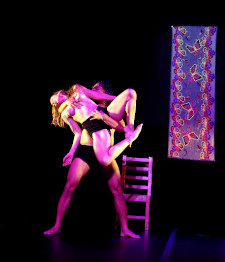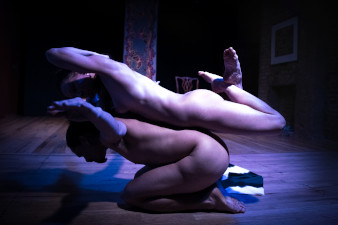
Barney Yates
TONGUE
OF THE FLAME
I attended "The Tongue of the Flame," conceived, co-choreographed and performed by Daniel Fetecua Soto and Blakely White McGuire, in the Martha Graham Studio at Westbeth on November 19. The piece is performed largely in the nude and you could be forgiven for thinking it would be mostly about Eros. On the last page of the program a poem, "Intoxicated Spirit" (uncredited), says, in part: A memory of your full lips on me. I peek through the window of my legs The world is upside down. Musical selections playing before the performance prepare us for sensuous content. One is "Volver," the Ranchera classic by Chavela Vargas, and there are a couple of French tunes I could not name. The event is well-attended and an introductory speech asks us to stay for a talk back. Soto and McGuire begin the piece nude and in delicate lighting. Their dancing styles are emblematic of their pedigrees: she was a principal dancer with the Graham company; he was a soloist member of the Limón Dance Company for ten years and is now a teacher of the Limón technique. As the show starts, McGuire wraps herself in a flag from the pre-set and later envelopes herself in an elastic pouch; Soto, enveloped in her flag, spins. I wrote in my notes, "It's all Eros," but I am wrong. As the later parts of the evening made clear, what they wanted us to know better was not Eros but caregiving and trust. You say, "Aren't caregiving and trust part of Eros?" Well...yeah...I guess. But they're not the parts we normally fantasize about. A little later in the show, they do get to directly fulfilling the poem by miming cunnilingus. But that is not a part you will remember. In my recollection of the piece, it's incidental. The movement is slow. She puts a blindfold on him. She dons black trunks. She tows him around the stage. She mounts his shoulders and claps. She puts trunks on him and worships his legs. He guides her around, hands over her eyes. We hear a song, "I just want to dance." She rides on him, eyes closed, in complex lifts. She tells him, "I'm gonna fall back." Now the audience knows for sure that some of what we are seeing is improvised.
He puts a dress on her. She ties up her hair. Still, her eyes are closed. Finally they open. He gives her a stringy black halter top. He dons a black shirt. She poses on a chair; he does too. The music turns jazzy and Latin. He spins holding her a lot. She pulls him around by the hair. He pulls her by her elastic straps. They take each other's tops off. He holds her diagonally with his arm between her legs (this has been a repeated pose in the evening). They are finally sweaty. She holds a butterfly puppet in her hand; he chases her. She pulls down a butterfly flag; he seizes a black one. They make a structure with two chairs. There are rain sounds. They are sheltering from the rain. Contrary to what the program said, this section is narrative. She gives him the butterfly, he plays with it. He hangs it on a wire and blows it to make it sway. He mimes the butterfly's wings. Takes her arm and bites it. Pulls down her drawers. She his. He lifts her to his shoulder. The dance is over. They pull on their clothes to the applause. Now the audience is quiet but everybody stays.
The talkback begins. The performers speak about the show as if it is a work in process. We learn this is the fourth iteration of the piece. Four scenes are choreographed, the rest is staged and structured but reactive to the audience and its energy. The dancers, we learn, don't usually talk as much in the show, although its greatly improvisation and they just try to free themselves to move. Composer Pablo Mayor's vernacular is Salsa and Latin Jazz. He, interestingly, has been founder and producer of NYC's Colombian music festival, Encuentro NYC, for 16 years. This performance is the world premiere of his score. All the fabrics and clothing are from their personal collections, for the energies that they hold. These memories may be vivid to the duo, but they don't project to us. They are just part of their process. McGuire and Soto have worked earnestly on the idea of giving yourself and trusting the other person. Trust is mostly the message of this work, I write in my notes. I think, maybe if they want to carry this project on to a fifth iteration, it is time for a director. As an extra (not part of the dance), they share a video they have recorded in Colombia. A river in the jungle is the setting, mostly, but there are cuts to the seashore. In the jungle setting, Soto is calling to animals, McGuire is bathing. Ants carry leaves. The audience is quiet as it exits. |
| museums | NYTW mail | recordings | coupons | publications | classified |



